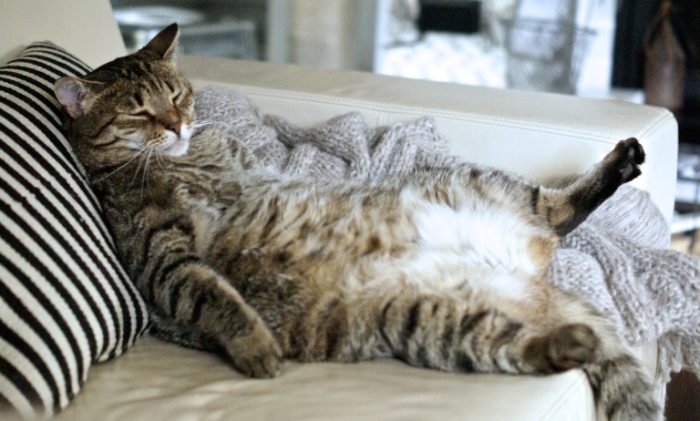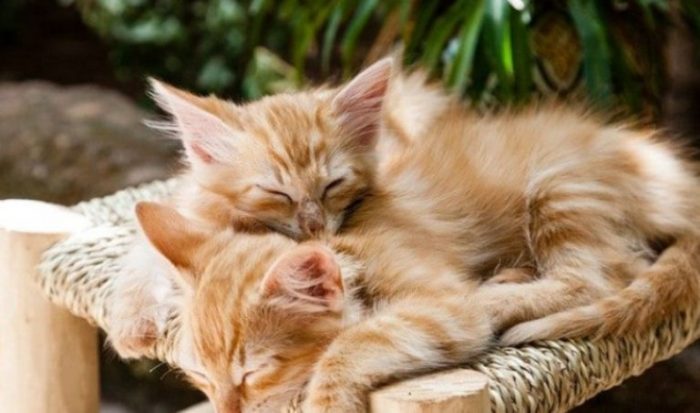The feline population is a notorious specie when it comes to napping. Observations have revealed that these cute furries spend a better part of their lives asleep, whether tucked away in their favorite spot or curled up on the lap of their parents. On average, cats are known to spend like 15 hours a day sleeping; this is twice the number of hours humans are expected to sleep. The 15-hour estimation is even for agile and healthy cats, but the extremely tired ones can take almost 24 hours of sleep per day. Now, the question for this piece is do cats have nightmares when asleep?
Table of Contents
Can Cats Dream?
It is quite reasonable to assume that any creature that spends so much time asleep has the propensity to dream. So, the answer to the question is in the affirmative, yes, cats can, and do, dream.
In the past, it was difficult for researchers to prove that the dream state is a possibility with felines, however, recent technology has let us know that cats, dogs, and several other creatures do go through dream-filled slumbers. In the same way as humans, felines experience different phases when asleep; this includes the REM (rapid eye movement) sleep which is the exact point at which dreams mostly occur.
Do Cats Have Nightmares Or Bad Dreams?
Yes, we have already established the fact that the feline population can fall into a dream state, but another question that needs to tacked says, do cats have nightmares too?
Though this has not been established by any scientific research, anecdotal evidence appears to suggest its existence. When your feline companion suddenly wakes up with a frightened look on its face, it is an indication of a nightmare or a bad dream. Sometimes a cat that has been napping peacefully may suddenly start twitching in an uncontrollable manner, another sign is that the cat’s paws may be zipping about in what appears to be general discomfort.
When this occurs, the chances that your fur buddy is having a nightmare are quite high. Alternatively, the furry may just be reliving some negative events from that day which usually gives rise to stressed sounds while napping. Also, we should not rule out the typical muscle twitching that is associated with REM. A cat that just had a bad dream may be extremely anxious once it comes awake.
Why Your Cat Might Be Twitching In Their Sleep
It is natural and normal for the dreams of a cat to be in connection with a bad event it experienced during the day. After all, their dreams have been determined to be based on experiences that are realistic and there’s nothing strange about kitties experiencing nightmares.
There may be no need to worry when you observe your sleeping furball stretching, twitching, snoring, or perhaps it may be emitting some unusual squeaking sounds. All these may just be in connection with REM. The twitch may generally represent a signal sent to the cat’s brain while dreaming.
There are pet parents who get worried at observing this kind of twitching, some even take it to be a sign of a seizure. However, the good news is that seizures are very unlikely to occur while a cat sleeps. Also, in the case of seizures, you are likely to observe additional signs like stiffening of the body, vomiting, lethargy, as well as loss of appetite. Once these symptoms are observed, your best bet is to schedule a vet visit immediately.
What Do Cats Dream About?
Since the question of do cats have nightmares is cleared, we are now faced with the possible things these felines might be dreaming about. Cats can dream about a lot of things and it goes as far as their thinking works. The question of what do cats dream about finds answers in the feline’s curious, unpredictable, and often misunderstood nature.
Memories
It is likely that your feline friend may relieve recent experiences while sleeping. Most kitties are blessed with remarkable long-standing memory capacity. Thus, they can even dream about things that happened in the far past!
Needs and Wishes
It is quite true that in-door only felines get all their requirements from pet parents. However, with all their needs well taken care of, they may still have wants that are likely to feature in their dreams.– this may be in the form of another delicious treat or the need to scratch on the household furniture.
Fantasies
It has been proven that there are many species of animals that are remarkably intelligent and some of them do have imaginations; this may be the case with some feline breeds. The likelihood of your furry friend fantasizing while asleep is quite high.
Cat Sleep Cycles
There are two sleeping cycles for felines; REM sleep and deep sleep.
1. REM Sleep
This is the phase in a cat’s sleep time that is associated with vivid, long-lasting dreaming sequences. Though it is also possible for your furry friend to dream during the other sleep stages, the REM is the major stage for dreams. Non-REM dreams can be quite different from REM dreams as they are often toned down, disconnected, and can be a bit less tangible compared to the REM dreams that are quite vivid.
During the rem sleep stage, the possibility of your furball drifting into a dream is high. It is at this stage that you will observe certain behaviors like twitching or squeaking of the eyes. The cat may also twitch its ears or tail. All the twitching notwithstanding, a napping feline will also experience atonia – this is known as loss of muscle tone.
Read Also: A Cat Sticking Out Tongue Could Mean One Of These
2. Deep Sleep

The rest of a cat’s sleeping time is referred to as deep sleep. This stage is very crucial and takes credit for body repairing and rebuilding.
There is one cardinal rule with sleeping felines; never wake a napping cat. Always allow them enough room to have a proper rest, just do your bit by providing your feline friend with a secluded and cozy space where it can feel free to snuggle up and drift into a deep sleep.
When it is obvious that your furbaby is having a bad dream, it is never a wise move to wake the cat as this may startle it and you may end up being scratched or bitten. It is just the same with humans, the cat won’t be able to decode anything in the initial few minutes after it awakens, and needless to say that protection will pretty much become its go-to instinct. Just allow the cat to dream and be ready with some little extra care and love when the napping cat wakes up
